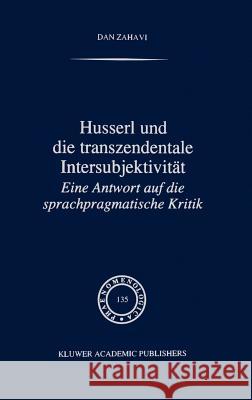Husserl Und Die Transzendentale Intersubjektivität: Eine Antwort Auf Die Sprachpragmatische Kritik » książka
Husserl Und Die Transzendentale Intersubjektivität: Eine Antwort Auf Die Sprachpragmatische Kritik
ISBN-13: 9780792337133 / Niemiecki / Twarda / 1996 / 224 str.
Husserl und die transzendentale Intersubjektivitat analyses the transcendental relevance of intersubjectivity, and argues that an intersubjective transformation of transcendental philosophy can already be found in phenomenology, especially in Husserl. Husserl eventually came to believe that an analysis of transcendental subjectivity was a conditio sine qua non for a phenomenological philosophy. Drawing on both published and unpublished manuscripts the book examines his reasons for this conviction and delivers a detailed analysis of his radical and complex concept of intersubjectivity, showing that precisely his reflections on transcendental intersubjectivity are capable of clarifying his phenomenological core-concepts, thus making possible a new understanding of his philosophy. Against this background the book then attempts to establish to what extent the phenomenological approach to intersubjectivity can contribute to the current discussions of intersubjectivity. This is achieved through a systematic confrontation with the language-pragmatical positions of Apel and Habermas. Die Abhandlung untersucht die transzendentale Relevanz der Intersubjektivitat und zeigt, dass eine intersubjektive Transformation der Transzendentalphilosophie schon innerhalb der Phanomenologie - besonders der Husserlschen - zu finden ist. Husserl gelangte zu der Auffassung, dass eine Analyse und Einbeziehung der transzendentalen Intersubjektivitat als conditio sine qua non fur eine phanomenologische Philosophie zu betrachten sei. Die Grunde, die Husserl zu dieser Uberzeugung fuhrten, werden herausgearbeitet. Dabei weist die Analyse des radikalen und komplexen Begriffs der Intersubjektivitat auf, dass erst seine Uberlegungen zur transzendentalen Intersubjektivitat viele phanomenologische Grundbegriffe ins rechte Licht stellen konnen und daruber hinaus ein neues Grundverstandnis seiner PhAnomenologie ermOglichen. Vor diesem Hintergrund wird die Frage, inwieweit die PhAnomenologie zur gegenwArtigen IntersubjektivitAtsdiskussion beitragen kann, durch eine systematische Auseinandersetzung mit der sprachpragmatischen IntersubjektivitAtstheorie von Apel und Habermas beantwort











